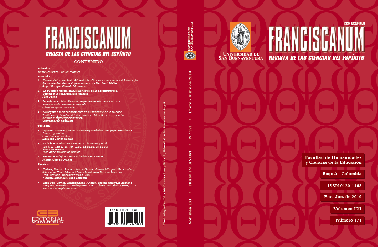This journal provides immediate open access to its content, based on the principle that giving the public free access to research helps a greater global exchange of knowledge.
Therefore, the Creative Commons 4.0 Attribution Attribution - Equal Share (by-sa) License is accepted: The commercial use of the work and the possible derived works is permitted, the distribution of which must be done with a license equal to that regulates the original work.
http://creativecommons.org/licenses/by-sa/4.0/
Along these same lines and in line with the Open Access policy, it is clarified that the authors maintain their rights to articles, without restrictions and, in the same way, they maintain their publication rights, without restrictions. They are only asked to reference the number of the Franciscanum magazine where the article initially appeared.
Abstract
El papa Francisco tiene una particular noción de pueblo al cual ha caracterizado, entre otros calificativos, de místico o mítico. En este sentido, recientes trabajos muestran que la noción de pueblo que el Papa maneja y desarrolla en su magisterio tiene su origen en la denominada Teología del Pueblo, doctrina de clara raigambre latinoamericana. Sin embargo, en este trabajo queremos proponer nuevos elementos conceptuales que podrían abonar la hipótesis de que la influencia más remota e indirecta –aunque no de menor peso– del Papa se retrotrae a los desarrollos teóricos de otro Jesuita, Francisco Suárez, quien en el marco de su filosofía política se refirió al pueblo como cuerpo místico.



















